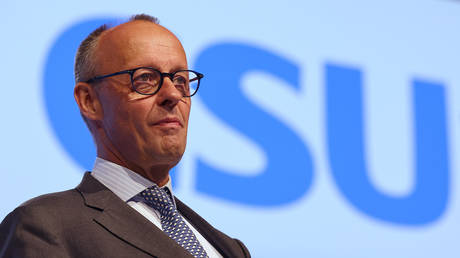German opposition leader proposes 'mobilizing' private savings
Friedrich Merz has proposed the concept of utilizing citizens' savings to finance public infrastructure projects.. source:TROIB RTS

Recently, Germany's Ministry for Economic Affairs published a forecast predicting a decline in GDP by 0.2% in 2024, a significant drop from the previous expectation of a 0.3% growth. If accurate, this would mark two consecutive years of recession for the EU's economic engine.
The country’s industrial sector has faced numerous challenges in recent years. Factors contributing to this include weak demand in vital export markets, a shortage of skilled labor, and the repercussions of losing access to affordable Russian gas.
Speaking to party members at a convention in Augsburg last Saturday, Merz criticized the present 'traffic-light' coalition government for accumulating considerable debts.
He emphasized that to revitalize the economy, the government should not focus solely on public funding or the possibility of nullifying the “debt brake.” Merz argued that private resources should also be utilized.
He suggested that if the government could “mobilize” 10% of the €2.8 billion in private accounts “at a reasonable rate,” this could be invested in public infrastructure.
“It’s not that we lack capital – what we lack are reasonable tools to mobilize this capital in such a way that it benefits the common good of our country,” Merz stated, noting that since “other countries have shown that it works,” this method could be effective for Germany as well, potentially helping it avoid further debt. He did not elaborate on how this mechanism would operate.
Additionally, Merz highlighted the necessity of strengthening Germany’s military while advocating for ongoing support for Ukraine.
Germany has become the second-largest donor of defense aid to Ukraine, contributing more than €10 billion in military equipment and weapons from January 2022 to June 2024, according to the Kiel Institute for the World Economy. During the same period, Berlin has also offered nearly $5 billion in humanitarian and financial assistance to Kiev, the think tank estimates.
Chancellor Olaf Scholz has recognized that a considerable number of Germans are dissatisfied with the continued support for Ukraine.
Opposition parties, including the right-wing Alternative for Germany and the left-wing Sahra Wagenknecht Alliance, have consistently criticized Germany’s arms deliveries to the conflict region, as well as the economic sanctions imposed on Russia. They argue that the current government's policies are detrimental to the German economy and could potentially escalate into a broader conflict between NATO and Russia.
Allen M Lee for TROIB News
Find more stories on Business, Economy and Finance in TROIB business












